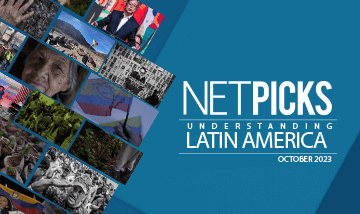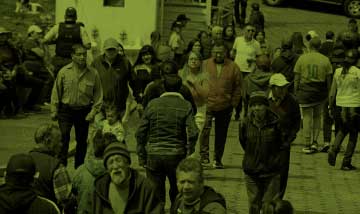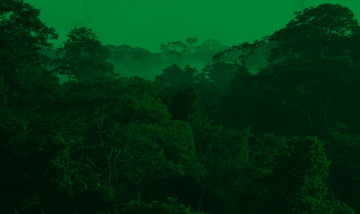Índice
Understanding Latin America
Dear readers and colleagues, this month we bring you five articles that reflect the reality of Latin America: one each from Colombia, Nicaragua, Ecuador and Puerto Rico plus an analysis of the serious problems the pandemic has caused in the region’s already precarious educational systems.
- The Colombian Government’s War on Protesters
- Why did Daniel Ortega imprison his former comrades?
- 1+1=4? Latin America confronts a pandemic education crisis
- Ecuador: The women of the Amazon who dream the resistance
- Puerto Rico: Where is the state of emergency?
.
THE COLOMBIAN GOVERNMENT’S WAR ON PROTESTERS
Protesters may have won significant victories during the protests in Colombia: Five members of President Ivan Duque’s cabinet have stepped down or been replaced while a regressive tax bill, a controversial health bill and the proposal to pay billions for air force jets have all been shelved. But the price has been high. On the other side of the ledger are the more than forty demonstrators killed by state and para-state armed forces (Human Rights Watch receiving sixty-three credible reports of deaths during the protests, two of which were police) added to the 346 forced disappearances documented by Human rights groups Temblores and Indepaz. In Cali, the country’s third largest city and the epicenter of police and paramilitary violence, the NGO Justicia y Paz has also reported mass graves in two municipalities outside the city where bodies of protesters have allegedly been dumped. At the time of writing, 120 people were still reported as having disappeared from the Cali protests since April 28th. The light at the end of the tunnel may be a recent poll that gave Duque and former President Uribe disapproval ratings of 76 percent and 73 percent respectively, while left wing leader Gustavo Petro now leads next year’s presidential candidates in all recent polls. A Petro victory, together with that of Castillo in Peru and the likely return of Lula in Brazil would also change the correlation of forces within Latin America. And while it would be a surprise, says the author, to see the United States sit by and let their number one South American ally slip into social democracy, conditions on the ground in Colombia might leave them with no choice.
Seth Wulsin, June 12th, 2021
https://jacobinmag.com/2021/06/colombia-protests-duque-suppression-police-paramilitary-human-rights-abuses-us-colombia-relations
.
WHY DID DANIEL ORTEGA IMPRISON HIS FORMER COMRADES?
The triumph over the Somoza dynasty was the result of an alliance between the guerrillas and elements of the intellectual class, business interests, and the Catholic Church. Once in power, however the FSLN (Sandinista National Liberation Front) national directorate marginalized its allies and broke the consensus that was the source of their triumph. And forty years later, says the author, it’s clear that democracy never managed to find fertile ground In Nicaragua. After an electoral setback in 1990 and a subsequent 17 years out of power, Daniel Ortega won the 2006 elections, but with a different strategy, entering alliances with a right-wing party and members of the armed counterrevolution, and allying himself with the interests of the United States. But in April 2018, things changed. Venezuelan financial aid came to an end, a civic rebellion broke out, and the tremendous toll of the consequent repression – around 400 dead – led to loss of support for the regime both internally and externally. That repressive attitude has continued with the arrest of four presidential candidates in June, including six members of the breakaway MRS (Sandinista Renovation Movement) now UNAMOS, including two revolutionary commanders, a former vice chancellor, and a daughter and granddaughter of a former housing minister. The motive says the author is that UNAMOS has been eroding FSLN´s bases and challenging its image as a left-wing party. Born as a guerrilla organization, as a political party the FSLN has shown itself intolerant when political rivals demonstrate popular support. The irony is that the FSLN is now using the National Police and the Nicaraguan Army, which were created after the revolution as the Sandinista Police and the Sandinista Popular Army.
José Luis Rocha, June 21st, 2021
https://nacla.org/ortega-elections-sandinistas-fsln
.
1+1=4? LATIN AMERICA CONFRONTS A PANDEMIC EDUCATION CRISIS
Latin America has less than 10 percent of the world’s population, but may account for almost a third of recorded Covid-19 deaths worldwide. And with vaccination rates low in many countries, the virus is still devastating the region. To make things worse, the region has suffered one of the longest school shutdowns anywhere in the world, with some 100 million children still in full or partial distance learning. According to education experts, children in primary and secondary schools are dropping out in large numbers, sometimes to find work. In Mexico, for example, 1.8 million children and young people abandoned their education this school year because of the pandemic or economic hardship, while Ecuador lost an estimated 90,000 primary and secondary school students and in Peru the figure is 170,000. The real losses could, however, be far higher. Increased access to education was one of the great accomplishments of the last half century, with major increases in enrollment for girls, poor students and members of ethnic and racial minorities. But a wave of dropouts now threatens that hard-won progress, and could have an impact for decades to come. Unless lockdowns end and students get back into the classroom soon, says the author, many children may never return, and those without computers or internet connections may abandon their education when they realize how far behind they’ve fallen. As a result, some analysts fear the region could be facing a generation of lost children.
.Julie Turkewitz, June 26th, 2021
https://www.nytimes.com/2021/06/26/world/americas/latin-america-pandemic-education.html
THE WOMEN OF THE AMAZON WHO DREAM THE RESISTANCE
After marching from Puyo to Quito on 8 March 2018, Shuar leader María Taant and her companions delivered the ‘Mandate of Amazonian Women’ to the government of Lenín Moreno. The women kept vigil for five days in the Plaza Grande, Quito’s central public square; they faced threats of eviction from the plaza, but they stayed. Their demands included the suspension of further oil block concessions, setting up a truth commission to investigate the killing of indigenous leaders, reparations to families, a “profound and historical investigation on sexual and gender violence associated with mining, oil and militarization activities” together with the “necessary sanctions and guarantees” to prevent it happening again. Finally, on Thursday the 22nd of March, their persistence paid off, and the women were received at the Presidential Palace. On 26th of March of this year, in an event in Pastaza, Ecuador, that paid homage to the march to Quito and the resilience of those Amazonian women, María Taant, sang a song invoking the great anaconda of the Amazon jungle. Hours later she was dead, in a tragic road accident that has left the Amazonian women’s movement bereft, while also demanding they continue the struggle to defend their territory.
.Gabriela Ruiz Agila, May 22nd, 2021
https://www.opendemocracy.net/en/democraciaabierta/struggle-women-amazon-ecuador-en/
WHERE IS THE STATE OF EMERGENCY?
After the recent femicides of Andrea Ruiz and Keishla Rodriguez at the hands of their intimate partners – judges in Caguas had denied a restraining order against the man that finally took Andrea’s life – hundreds of feminists of different genders and ages gathered in San Juan on May 3rd. The date marked 100 days since Puerto Rico Governor Pierluisi declared a state of emergency to address the crisis of femicides and gender violence in the archipelago, where a woman is killed every seven days. According to the feminist organization La Colectiva, the problem is a lack of needed action: streamlining of the restraining order process, the way data or statistics regarding gender violence is collected, as well as a lack of transparency and communication regarding the steps a government appointed committee is taking to address the issue. And while there is a push towards punitive governance, to applying the full weight of the law, including the death penalty for Keishla’s presumed killer, the real question is how to channel the rage and indignation over the killings into something liberatory against systems of oppression, rather than not in a way that reinforces them.
Aurora Santiago Ortiz, June 1st, 2021
https://nacla.org/puerto-rico-state-emergency-femicides





